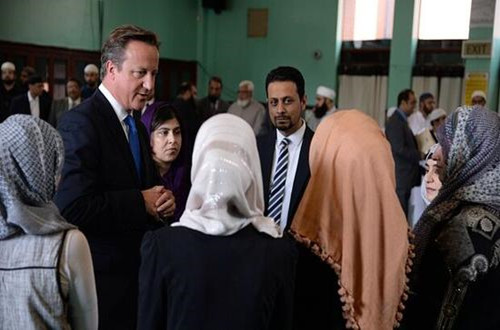Britain Asian Muslim women
英國 亞裔穆斯林女性
All about taking part
全面參與
A hidden explanation for Britain’s surprising job numbers: Bangladeshi and Pakistani women are finally surging into the labour market
對英國令人驚訝的就業數字的深層解讀:孟加拉國和巴基斯坦的女性最終進入勞動力市場
In an upstairs room at the Jagonari women’s centre in eastLondon, six women in colourful headscarves grin as an instructor enunciates simple English phrases from a whiteboard. The women are mostly new immigrants from Bangladesh, who are being taught English as part of the centre’s “positively integrated” programme. In other classes they will learn how to deal with doctors, police officers and council officials, how to use public transport and how to claim benefits. The idea is to help them find their way around British society—and eventually find jobs.
位于倫敦東區加各(Jagonari)婦女中心的一個樓上房間內,一個導師在白板前教單的英語詞匯時6位帶著彩色頭巾的女性咧著嘴笑。這些女性主要是來自孟加拉國的新移民,她們學習英語是該中心“積極移民”的一部分。在其它課程中,她們將會學習如何與醫生、警察、政府官員打交道,如何使用公共交通工具,如何申請救濟金。這個計劃是幫助她們如何適應英國社會—最終找到工作。

Britain’s 450,000 Bangladeshis and 1.1m Pakistanis, who began to arrive in large numbers in the 1960s and 1970s, suffer from a huge penalty that is partly self-imposed. Whereas Pakistani and Bangladeshi men have employment rates roughly comparable to black men, the women’s employment rate is around half that of other ethnic-minority women. Lack of a second income is the main reason why more than half of Bangladeshi and Pakistani families live below the official poverty line, and why so many rely on welfare payments to top up their income. The broader cost to Britainof the economic and social marginalisation of so much of its Muslim population is huge. Yet there are some encouraging signs of change.
英國的450,000孟加拉國人和110萬的巴基斯坦人是在上世紀60、70年代大量涌入,他們遭受了巨大的遭難,部分是自身原因造成的。巴基斯坦、孟加拉國男性的就業率幾乎和黑人一樣,但女性的就業率差不多是其它少數民族的一半。缺少第二收入是一半以上的孟加拉國、巴基斯坦家庭生活在官方貧困下的主要原因,也是為什么如此多的家庭依賴社會福利增加救濟金。穆斯林龐大的人口如此多,對經濟和社會的邊緣化,給英國造成了更大的成本。然而有一些鼓舞人心的現象改變。
A combination of traditional culture and modern prejudice keeps women out of work. Many still feel that it is the husband’s role to provide for the family. Even if they want to work, Bangladeshi and Pakistani women are often expected to do a lot of cleaning, cooking and taking care of children, which leaves little time for a job. Village habits die hard: married women still tend to move in with their in-laws, who sometimes jealously restrict their freedom. Staff at the Jagonari centre report encounters with women who are not allowed to learn to drive or even to leave home alone.
傳統文化和現代歧視讓女性不能工作,一些人仍然認為養家是丈夫的責任。即使她們想工作,孟加拉國和巴基斯坦的女生不能不做大量的清洗、燒飯、照顧小孩,剩下工作的時間就很少。陋習很難改掉:已婚女性通常和公婆住在一起,公婆有時會因嫉妒限制她們的自由。加各中心的工作人員報告稱女性遭遇阻礙不允許學車,甚至不能單獨出門。
Then there is an “ethnic penalty” in hiring. Some 30% of Bangladeshi women who want to work are unemployed. Even well-educated women with Islamic names can struggle to get interviews, says Shaista Gohir, a director at the Muslim Women’s Network. Many employers are reluctant to hire women they fear will leave to take care of children. For new migrants, meanwhile, poor English and weak formal education are huge barriers to work, crowding those women who do so into poorly-paid and menial jobs.
之后在雇傭上有“民族歧視”。一些想要工作的30%的孟加拉國女性失業。即使是受到良好教育的穆斯林名字的女性很難有面試,穆斯林女性網站做主管的謝思達-高赫爾說道。許多雇主不愿意聘用女性,擔心她們因照顧小孩辭職。同時,對新移民來說,英語水平差,教育程度低也成為找工作的障礙,使這些女性集中在收入低不體面的工作種類中。
According to the Labour Force Survey, though, the number trying to find work is increasing surprisingly fast. Since 2008, whenBritainentered a deep recession, the proportion of Pakistani women active in the labour market has increased from 29% to 43%. For Bangladeshi women, the trend dates back further (see chart). Many have merely moved from complete inactivity to unemployment, but there have been sizeable jumps in the proportion who have jobs too. By contrast, the employment rate for white women, at around 68%, has barely changed. Among black African andCaribbeanwomen it has fallen.
據勞動人口調查報告統計,然而,出人意料的是努力找工作的人口數量迅速上升。2008年以來英國經濟受到重創,活躍在勞動市場上的巴基斯坦女性比例從29%增長到43%。對孟加拉國的女性來說,這個趨勢可以追溯到2008年之前。(見圖表)許多多僅僅是從完全的不活躍狀態到失業。但有工作的人的有很大的變動。相比之下,白人的就業率幾乎沒有改變,差不多是68%。非洲黑人和加勒比的女性就業率下降了。
Government policy probably explains some of this. Since 2005 new migrants have had to pass basic language and citizenship tests to get permanent leave to remain in theBritain, which has forced many new migrants to learn English. Tax credits—generous welfare payments linked to work—have encouraged women of all races to find jobs, especially those whose husbands earn little.
政府的政策可能解釋了一些原因。2005年以來,新的移民不能不通過基本的語言和國籍身份考核才能獲得在英國的永久居住權,這迫使一些新的移民學習英語。免稅額度(工作中豐厚的社會福利)鼓勵不同種族的女性找工作,尤其是丈夫工資少的女性。
Just as important, they are settling in. British-born Pakistani and Bangladeshi women are far more likely to be in work than new migrants. And the young generation is rising fast. “There has been a near total transformation of Bangladeshi girls” since 2001, argues Shamit Saggar of the University of Sussex. In the GCSE exams taken at the age of 16, Bangladeshi girls now outperform their white peers. Control for poverty, and they beat almost everyone. Pakistani girls have done less well—probably because they are less concentrated in London, where schools have improved most—but they have gained ground too. More of these well-educated second- and third-generation young women enter the labour force each year.
同樣重要的是,新移民也做了準備。與其它新移民相比,英國出生的巴基斯坦和孟加拉國女性更愿意工作。并且年輕的一代也迅速增長。蘇塞克斯大學的S.薩格(hamit Saggar)認為,自2001年來,孟加拉國的女孩有一個近乎全面的轉換。對于16歲需考的英國普通中等教育證書中,現在孟加拉國的女孩比同齡的白種人表現優秀。在戰勝貧窮上,她們也比任何人頑強。巴基斯坦的女孩表現較差,倫敦增長了最多的學校,可能是因為她們注意力不集中,但她們也獲得了發展。每年,大多數受過良好教育的第二代第三代年輕女性進入勞動力市場。
Meanwhile there is growing awareness of the problems faced by first-generation immigrants. InBirmingham, the council is offering women help to start small businesses, reckoning that home work can fit more easily around family commitments. The Jagonari centre already runs two social enterprises doing similar work.
同時,第一代移民越來越意識到這個問題。在伯明翰,委員會給女性提供幫助讓她們開辦小型的企業,認為在家工作可以更容易的擔負家庭的責任。加各(Jagonari)在已經有兩個社會企業在做類似的工作。
The main worry, in austerity Britain, is the paucity of cash. Since 2011 English language classes have been free only to those claiming unemployment benefit, which excludes many women claiming other benefits. Welfare is also being squeezed—all benefits are due to rise by less than inflation until 2015. Unless more women go to work, Bangladeshi and Pakistani poverty rates are likely to spiral upwards. “There is so much frustrated ambition”, says Sultana Khanom, one of the workers at the Jagonari centre. It needs to be made use of.
對于實行緊縮政策的英國來說,最大的擔心是資金不足。自2001年,只有領取失業救濟金的才能免費上英語課,而領取其他救濟金的不行。社會福利也正在減少,到2015年來所有的社會福利的增長速度都比通貨膨脹慢。除非更多的女性去工作,不然孟加拉國和巴基斯坦的貧困率有可能飛速上升。加各中心一位工人Sultana Khanom認為有太多恐慌的野心抱負,需要好好工作。翻譯:楊蕓禎












